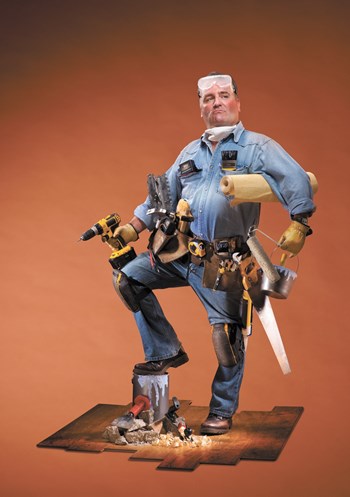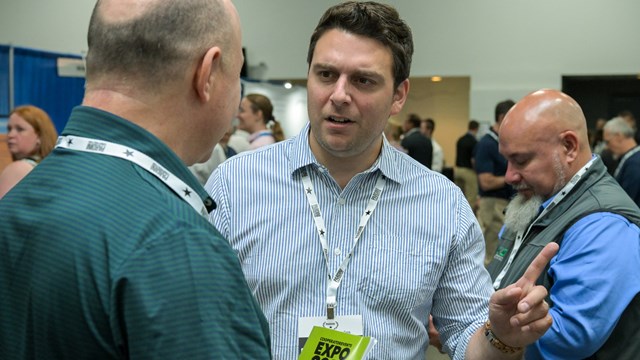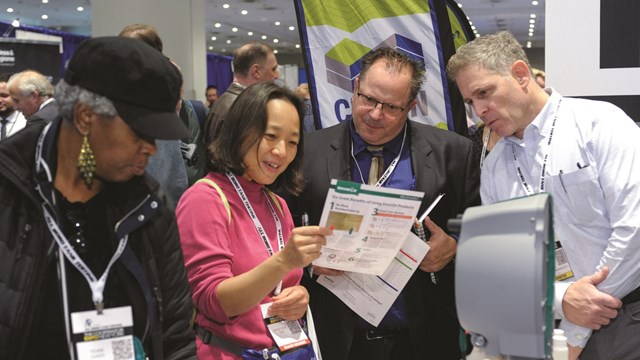
When everyday problems arise in a multifamily building or community association, residents frequently turn to their friendly neighborhood jack-of-all-trades: the superintendent (depending on where you live, you might call him or her your building engineer, maintenance manager, or building operations manager. But for the purposes of this article, we’ll stick with ‘super,’ for the sake of simplicity). Supers are often asked to wear many hats in addressing the needs of the association: they can be a handyperson, property historian, tech wizard, security expert—you name it.
Given the breadth and variety of responsibility that comes with the position, it’s crucial for a board to know what it needs from its super, and how to determine whether a particular applicant for the job can meet those needs. There are some general attributes a super should have, and there are specific skills that may be necessary as well, depending on a given association’s demographics and resources.
Skill Set
“The super position requires an individual to have a wide range of skills and abilities that provide value to the association significant enough to offset the cost of having them on the payroll,” says Tim Arel, Owner and Principal of NorthPoint Property Management in Nashua, New Hampshire. “This individual has to have the ability to provide a high level of customer service as a representative of the board; to provide project management and oversight of outside vendors; to have a trained eye to inspect the property proactively for maintenance needs; to have sufficient skill to address a great number of issues and perform a basic level of preventative maintenance; and understand financials well enough to keep projects on-budget and the association operating efficiently.”
While it might seem common sense for a board to hire someone with general hands-on repair and maintenance skills, that’s not necessarily the case, according to Arel. “From the association’s perspective,” he says, “it’s better to have someone more skilled at identifying preventative maintenance needs, who has the ability to call in the correct people to perform the repairs. While you may spend more for that in the short term, the long-term benefits are a properly run and maintained property, and extended lifespans of major building components. That will provide long-term budgetary savings.”
Of course, at a first meeting it can be difficult to ascertain how adept a super will be at identifying an association’s issues; this is something a board can best assess and evaluate over time. From a hiring perspective, Andrew Di Schino, an account executive with property management firm FirstService Residential in New York City, suggests that an association first look at a potential super’s past tenure and experience, in conjunction with verifying that he or she carries the proper agency qualifications and licensing. (These can vary from state to state, but in New York, this can mean EPA 608, FDNY Certificate of Fitness, and FDNY Chiller/Refrigeration Machine Operator License, among others).
“I generally work from references, but there are a number of good organizations to work with that source and vet promising candidates for these jobs,” says Di Schino. “For example, the Emerald Guild, the New York Metropolitan Building Managers Association, and the Scandinavian American Building Managers Guild, to name a few.”
“Networking is invaluable,” adds Arel, “because you’ll know the type of person you are hiring before they start. This type of individual is not easy to find, and properties that have a good building engineer will do everything they can to keep that person working for them. It’s currently even more challenging, given the low unemployment rate. As such, boards may want to think outside the box by prioritizing the needs of the property and finding candidates who have a strong skill set in those areas. The board or management company will need to invest in this individual to train them to better understand the other aspects of the property, but that investment will pay off in the long term.”
When interviewing potential supers, Di Schino recommends that applicants be treated with the respect warranted by someone at a managerial level. “It’s a professional interview like any other,” he says. “Many – though not all – superintendents are unionized, but that changes nothing about the approach. Functionally, they are a part of management, no matter who may represent their labor interests, and you will depend on them for your successes or failures. It all depends on how you treat/manage them – and that applies to all staff members of any building.”
Speaking of unions, in New York, Di Schino notes that “If unionized, the supers are typically subject to the terms of Local 32BJ’s Resident Manager Agreement, which is negotiated from time to time with the Realty Advisory Board. It’s not dissimilar to the Apartment Building Workers Agreement, but it expires on a different schedule to prevent gaps in coverage in the case of a strike. Generally, there is a six-month probationary period during which a super may be terminated with no contest. If you are an engaged manager and are attuned to the performance of your hire, this is rarely a challenge. If people don’t work out after that period, they are generally subject to progressive disciplinary action, up to and including termination.”
In Arel’s area, supers (or building engineers) tend not to be unionized. “They’re being hired as the employee of the property and as such, you shouldn’t be dealing with a union issue,” he explains. “The best process for an interview is to include a tour of the property and ask the candidate to share their knowledge of and recommendations for the systems and infrastructure on the premises. If a board has some trusted vendors, they may want to ask them to assist in the screening process. The board needs to understand that the individuals they’re hiring are supposed to know more than the board does about proper maintenance and the various building systems. So it’s important to involve others who have the knowledge and skills to determine if a given candidate truly understands the association’s needs.
“Most employees are hired with a 90-day probationary period and are at-will employees,” Arel adds. “That means that they can be let go at any time and for no reason. However, that also means that the employee can leave at any time. As such, the board needs to understand that it is making an investment in its community, and in the individual that it is hiring.”
Legal Considerations
Evaluating and properly screening a potential super is not only a practical matter for an association; it can be a legal one as well. In order to stay on the right side of local labor laws and avoid liability risks, a board should make sure that it’s performing its due diligence in the screening, interview, and hiring process.
There are certain questions that a board should ask itself about who this super is, and what tasks he or she should be performing, according to Ellen Hirsch de Haan, an HOA and condo attorney with the firm Wetherington Hamilton in Tampa, Florida. “Does the person need any licenses or specialized training to do the job? If so, the board will need copies of those licenses, and documentation of any training. What is the scope of all of his or her duties and tasks? That needs to be specifically spelled out in a thorough job description. Does this person have the authority to spend money? If so, with whose approval, and how much? Were they fired from any prior jobs? Will they be supervising staff? If so, they should have human resources training regarding discrimination and harassment. Will they be interacting with the residents? Are there any circumstances in which the super would be inside a home or otherwise on private property? What are those circumstances, and what are the rules of engagement?”
And of course, there are things that a super should not be expected to do —and those tasks are best bid out to an appropriate contractor. “Our maintenance needs would be primarily addressed through a contracted engineering firm, who would compose the project specifications, send them to interested companies, and then review and refer the best choice,” explains Raymond Barnes, community manager of The Ponds in Monroe Township, New Jersey. There are some things that are just outside the super’s job description, and identifying those is the responsibility of the board!
Hirsch de Haan also strongly recommends that boards “be sure that the association attorney assists in creating a comprehensive contract which covers not only the job requirements, but also salary, performance reviews (how frequently, and by whom), vacation and personal time, holiday hours, overtime, term of contract, and conditions of termination with and without cause.”
“Hiring an employee is a wholly different ballgame from hiring a contractor,” notes James Stevens, a principal with law firm Chuhak & Tecson in Chicago. “We generally recommend that associations speak with their attorney to review the federal, state and local laws that may apply to that employment relationship. Laws that relate to wages, termination and minimum insurance requirements may depend on the number of employees that the association has, and increases and decreases can change which requirements apply. A good rule of thumb is that getting into the employment relationship should be as easy as getting out of it, if at all possible. In the real world, navigating that relationship – or the end of it – can be made far easier with an employee handbook or contract.”
Associations should also take into account the physical requirements of the super’s job, and state them clearly in the job description. “Subject to counsel’s recommendations – because some requirements may be impermissible – it’s useful to list the physical needs of the particular position, if any, so that there are clear expectations,” Stevens says. “Though we hope it doesn’t happen, workplace injuries and workplace disability issues come into focus if an employee is injured while working on the job. The physical requirements of the job, if outlined clearly, can help to resolve these issues if they unfortunately arise.
“One of the most important questions to ask is whether the board’s counsel is sufficiently versed in employment matters to guide the association through the pertinent employment law issues,” Stevens continues. “Employment law is just as specific as condominium and cooperative law, and may be something for which experienced advice is paramount.”
Your building or association’s super is a key player in the smooth operation of your community – so finding the right person for that position is a serious undertaking for any board. With a clear sense of needs and expectations, good advice from professionals, and a firm grasp of everything the job entails, your board can position itself for success in the super search.
Mike Odenthal is a staff writer/reporter for The New Jersey Cooperator.






Leave a Comment